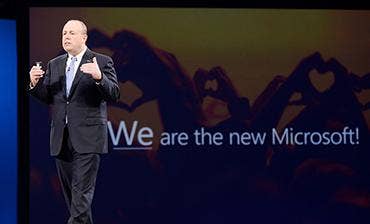All That Google Touches Is Not Gold: Channel Partners Jump To Microsoft
Google may love the Alphabet, but it can't spell c-h-a-n-n-e-l.
Some of Google's most loyal cloud solution providers -- including those who have been working with the vendor since it launched its channel efforts in 2009 -- told CRN it's no longer financially viable to exclusively partner with the Internet giant.
A number of those regional Google channel pioneers who had bet big on Apps, the centerpiece of the Google for Work portfolio, told CRN they are adding a Microsoft Office 365 practice. Some are even striking Google from their portfolios altogether.
[Related: Cumulus Global, A Google Apps Reseller Pioneer, Adds Microsoft Office 365 To Cloud Portfolio]
One source with ties to Google estimated that as many as 80 percent of Google's several hundred once-exclusive regional partners are now selling Microsoft Office 365. "It's very hard to be a Google-only VAR now," said the source. "It's just not as lucrative. It has become a niche business."
The executive estimated that gross margins on Google Apps licensing and services combined have dropped by as much as 33 percent in the past two years as customers' appetites for Google services have waned, even as Microsoft Office 365 licensing and services combined margins have climbed by anywhere from 25 percent to 100 percent during that same period.
Google -- which on Aug. 10 disclosed plans to restructure itself as a holding company called Alphabet with several of its businesses, including Google itself, underneath that as independent subsidiaries -- did not respond to a request for comment on the estimates.
In addition to the margin crunch, there are a number of other factors solution providers say make it difficult for them to maintain and grow a profitable Google Apps business. These factors suggest that Google is pivoting its channel focus to just a few large partners to fight its productivity suite war with Microsoft, undervaluing the power and influence of its more numerous regional partners, solution providers say.
"The majority of partners are just going to go away and say [to Google], 'You're not a partner at all.' The rest are just going to get pounded," said an early Google Apps partner based on the West Coast that added Microsoft to its portfolio last year.
Top of mind for some of those partners interviewed by CRN is the likelihood that they will lose their current standing as Premier Google partners once a requirement for $500,000 minimum in new business to qualify for the vendor's top partner tier rolls out in 2016.
The steep minimum will likely slash the number of premier partners from more than 100 -- many of those midsized regional partners -- to about 10 large national or global partners, estimated the source.
In addition, most of the partners interviewed for this story complained of unresponsive channel representatives, a direct sales team that either competed for their business or funneled work to a handful of favored partners, and slower-than-promised development of downstream solutions to round out the portfolio.
"We have to reallocate those resources to more profitable efforts, which means they're going to have less people promoting Google," said the West Coast solution provider, who expects his company to lose its Premier status once the new revenue requirement goes live.
Murali Sitaram, Google's director of global strategic partnerships, told CRN the concerns raised by some partners for this story aren't at all illustrative of the larger trends across the Google for Work ecosystem.

"It's not about a smaller set [of partners] at all," Sitaram told CRN, noting that Google for Work's channel ranks have swelled to 13,000 partners, 95 percent of whom sell Google Apps.
Regional solution providers interviewed by CRN, however, said their experiences suggest Google is not interested in growing its business with them.
Bob Venero, CEO of Holbrook, N.Y.-based solution provider Future Tech, No. 232 on the CRN 2015 Solution Provider 500, said he tried to develop a strategic relationship to bring Google into its Fortune 500 global accounts but hit a brick wall after reaching out to a top enterprise business development executive who failed to follow through.
"Based on my experience, Google does not get the channel, and I love Google as a company," said Venero. "Look at what they have accomplished, it is an amazing feat in terms of their technology assets and offerings. But they missed out on a golden opportunity to scale into the enterprise through the channel with companies like Future Tech. They definitely don't have the right people at the helm of their channel."
Venero said he made a concerted effort to develop an enterprise engagement strategy with Google but came up empty-handed. "We handed them an opportunity to gain access to our top corporate accounts in the global enterprise, and it fell on deaf ears."
Such partner malaise couldn't come at a worse time for Google, which is feeling the heat from a no-holds-barred Microsoft campaign to dominate the desktop and tablet cloud productivity suite market. Microsoft, in fact, claims to have won back from Google 1,252 business customers in the last year and a half and is moving swiftly to bring Google Apps solution providers into the Microsoft channel fold.
"Microsoft is aggressively approaching us," said the Premier partner on the West Coast. "They see us [and say,] 'You were a Premier Google Apps partner. You get it. You understand the cloud. You've got a business model that works.' "
New research from the Bitglass, a cloud access broker based in the Silicon Valley that has tracked SaaS adoption rates for the past couple of years, proclaims a complete inversion of the competitive landscape, in Microsoft's favor.
The Bitglass 2015 Cloud Adoption Report, which will be made public this week, will show that Microsoft has jumped ahead of Google in adoption rates, a Bitglass representative told CRN. Over the past 15 months, Office 365 has far outpaced Google Apps with rapid adoption "that shows no sign of a slowdown."
That's a stark turnaround from 2014, when Google dominated the cloud productivity market with 16.3 percent adoption of Google Apps, compared with Microsoft Office 365's 7.7 percent share, according to Bitglass.
Of enterprises surveyed by Bitglass, 29 percent plan to deploy Office 365 sometime in the future, compared with 13 percent for Apps.

Cumulus Global, one of the original Google Apps resellers and a Google Apps Premier partner, is expanding its cloud portfolio with Microsoft products, starting with Office 365.
Founder and CEO Allen Falcon, who started helping companies migrate to Google Apps in 2006 before the search engine giant even had a channel program, said he sees broader opportunities for Westborough, Mass.-based Cumulus Global in the future partnering with Microsoft instead of continuing to provide only Google Apps.
"It's clear from a market perspective that Microsoft has or is close to closing the gap," said Falcon. "We definitely see a market shift and see those trends, so we decided this is the time to make that shift."
Cumulus Global continues to see healthy year-over-growth in its Google Apps business, but sees "broader opportunities and additional opportunities" by taking on Microsoft, said Falcon. Microsoft has made "great strides" in its operational reliability, the way it integrates, and in the product line itself, he said.
Early Success -- Then Channel Schizophrenia
Google is as iconoclastic as tech vendors come -- regularly and rightfully celebrated for its creative approach to business.
Since the launch of Google Apps in 2007, which at the time was considered the premier cloud productivity suite, the company has grappled with how to best deliver the technology to market. The Internet search engine giant, which makes most of its money selling advertising, approached the enterprise market with little experience operating an indirect channel and a "smartest guy in the room" swagger playing by its own channel rules.
In the glory days, Google Apps pioneers say they flourished under Google's ethos of independence, innovation and rejection of traditional business hierarchies.
But things began to unravel.
It started around 2010, when Google, recognizing the importance of partners in making a deep push into the enterprise, decided to open wide that channel.
It was a free-for-all.
"Anyone could become a partner. As long as you bought some minimum number of licenses for $1,000, fill out a form, and you become a full partner with all the same pricing and structure that we got. We weren't special anymore," said the unhappy West Coast partner. "There was a lot of backstabbing between partners running out there and stealing business from each other."
The chaos of Google's come-one, come-all partner strategy led to an epochal moment in Google's channel evolution: the recruitment of Oracle's vice president of sales, Amit Singh, to head sales in March of 2010.
By 2011, Singh, now president of Google for Work, brought to Google new sales leaders -- a number of them from Oracle -- importing a strategy of driving enterprise expansion by teaming direct sales with a select group of global system integrators.
"That's when the culture changed," the West Coast partner said, describing what partners called Google's channel schizophrenia. "The direct sales agents started to compete. They started changing the program, giving quotas to everyone. Sales reps started doing more internal business."
Google's Sitaram told CRN that period was one in which "we matured as a business."
"We started going after a higher pedigree of customers," the Google director said. "Some of them, for regulatory reasons and others, wanted to do direct business with us."
But partners told CRN that if they weren't driving astronomical sales gains -- which was difficult when competing with Google's direct sales efforts -- they were treated like outcasts, assigned channel representatives handling hundreds of accounts who barely gave them the time of day.
The former partner from the South told CRN: "Google made what I thought was a great product. The first and largest mistake they made was they had a direct model and a reseller model. They kept saying they wanted to switch to the reseller model, but paid that lip service."
Jason Lee, founder of Maven Wave, a large Google for Work partner based in Chicago with sales well above the Premier threshold, said there was confusion around that time in the go-to-market strategy. But in the years since, Google has corrected its model and these days always prefers that customers buy through resellers.

Sitaram told CRN that Google is transitioning "to becoming as much of an indirect business as possible.’
The only customers "we want to take direct are the ones we have to take direct," he said, without quantifying the percentage of Google Apps accounts he expects will be handled via direct sales reps.
One early reseller from the Northeast no longer doing business with Google, however, said he invested heavily in his practice, then found it impossible to scale because of the headwinds Google created.
"Google has a terrible sales culture, and a terrible go-to-market strategy. They didn't create value in their partner channel," he said.
As the honeymoon period faded from memory in Mountain View, Calif., Microsoft was steadily advancing a rival product, Office 365.
Culling The Premier Partner Ranks
There's a sentiment among Google partners who talked to CRN that Google channel executives are interested in moving to a handful of large account resellers -- LARs in Microsoft parlance -- to drive the vast majority of business.
Regional partners say proof positive of that trend is a new $500,000 Premier partner revenue bar for new business that will formally take hold Jan. 1, along with additional requirements that all that revenue be sourced directly by the partner, and that premier partners post yearly growth in bookings of more than 25 percent. The new program also drops margins for those not making the grade from 20 percent to 15 percent on renewals after the third year on the account.
When those changes were announced at the start of this year, longtime partners, especially those in smaller markets, bristled at the distance Google has moved the goalposts. Previously partners could qualify for the Premier tier by bringing in 15 new customers a year, with no revenue threshold.
Several partners told CRN the changes essentially make it financially untenable to be a Google Premier regional partner.
"I know personally, they're unachievable for my company. I will end up losing my Premier status in January," one partner in the Southwest told CRN of the new benchmark. Being "demoted to an affiliate program" is particularly frustrating, he said, because he went all-in on Google in his managed services practice and closed a number of large deals.
Google's move demonstrates that it has underestimated the knowledge regional partners have of the local businesses they serve, solution providers said. It's a far different value proposition than what some of them describe as the "churn and burn" LAR model Google is moving toward with the new Premier revenue minimum.
One top executive for an East Coast Google Apps provider that is now also selling Office 365 said the search engine giant has made a big blunder.
"Underestimating the power of midsized VARs who are willing to invest in the competencies to serve customers really well by any vendor is a mistake," the executive said. "I don't see LARs giving the same type of highly customized service to the clients that we do. That is not the business they are in. Our value is our knowledge of our customer's business. It is about the customer relationship."
The executive noted that many of his customers rely on him for specific vertical market business expertise -- and specific knowledge of their business -- not just technology solutions advice.
Google has made a huge channel gambit that has already backfired as partners embrace Microsoft, solution providers said. Microsoft's relationships with the born-in-the-cloud Google partners give Redmond, Wash., a huge weapon in the war to win market share against Google. Microsoft has, in effect, won over the hearts and minds of the Google channel, regional midsized partners told CRN.
The source stressed that Google, for its part, feels it is building a much stronger channel with its new program. "It's a huge gamble for Google," said the source. "The upside is they have a consolidated channel that is more efficient at driving sales with lower infrastructure and support costs. The downside is if it doesn't work, the LARs don't generate the volume that Google expects they will, and regional solution providers with customer relationships that have been cut out tell those customers to go to Microsoft."
Those who were upset told CRN Google's motivation for making program changes was obvious and understandable -- the vendor had overextended its channel.
"Google trying to ramp to 10,000 partners was a mistake in the first place for many reasons," said another West Coast reseller, who doesn't object to the program changes and is happy with his relationship. "They are spending millions of dollars unraveling that now," he said. "They should have been trying to create five to 10 really healthy [partners]. They are doing that now with all sorts of funding and incentives."
But while cutting off the "long tail" isn't a bad idea in itself, some partners believe Google is in the process of removing everything below the neck.
"At this point we are planning to wind down our Google reseller practice by end of year," the Southwest partner said.
Beyond the sting of dropping in status, the renewal reduction on already low-revenue accounts will be a major financial setback, he said. And Google is barring non-Premier partners from advertising with the "Google Apps" keywords on Google AdWords, handicapping efforts to re-enter the top-tier, he said.
"They're saying you're welcome to stay, but you need to live on the back porch, you can't talk to anyone that lives in the house, we're going to feed you the table scraps, and if you don't gain 15 pounds you're even going to be penalized more," that partner said. "Just kick me out of the house. Don't make me suffer a slow death on the back porch."
"There will be five partners that are doing Google Apps business and Google Apps will start being less and less relevant in the industry," the West Coast partner who last year added a Microsoft practice told CRN. "Microsoft will be back in the lion's share of messaging and collaboration like they were before Google started making a real dent."
But Google denies that it is moving to a model that supports only a handful of Premier partners.
"The long tail is very important to us. I just want to make sure that’s absolutely clear to our ecosystem," Sitaram told CRN.
The partner program director did say, however, that he expects to see some partners "self-select themselves out" with the changes.
Those are "partners who haven’t invested, don’t have the skill sets, who are not growing and investing and learning about technologies," Sitaram told CRN. "They won't be effective in supporting our customers."
Dan McNelis, founder of Dito, a Manassas, Va.-based Google partner, told CRN that raising the bar can push a partner to step up its game.
And "if a partner is looking at the goals that Google has set out for it, and recognizes early that level of business is not the right fit," they should consider other options.
"I see an ever-expanding market," McNelis said. "There's a lot of white space still out there and opportunity. The pie isn't shrinking."
The West Coast reseller who also supports the program changes told CRN: "It's certainly the case that there is some shoring up taking place in the world of the top Google for Work partners. The ones performing well continue to get more business, and the smaller ones are struggling."

Enter Microsoft
Microsoft doesn't exactly tread lightly when taking on competitors.
Microsoft Chief Operating Officer Kevin Turner, in a keynote at the company's global partner conference last month, told thousands of Microsoft partners that Office 365 had won back from Google 1,252 customers in the past year and a half, mocking a past interview from Singh where he said he planned to nab 80 percent of Microsoft's Office business.
"We've got to go rescue the rest of the Google Apps customers," Turner told a roaring audience. "There are still a few out there. Go rescue them. Get them over."
"We have to go win every single deal versus Google," Turner told his troops.
In attendance were many Google partners who Microsoft invited to Orlando, where they were treated like visiting royalty: wined, dined and aggressively courted by Microsoft's top executives.
The former partner from the Northeast said Google has squandered a seven-year head start on Microsoft.
"Microsoft had no idea how to deal with that. It took them two years to come to market with a crappy product. Two more years with a halfway decent product," he told CRN. "But now Office 365 is comparable to Apps in quality, and Microsoft's program is responsive to partners in a way that Google's is not."
The other West Coast partner, who signed up with Microsoft last year and now brings to market both competing products, told CRN he still loves Google Apps, but Office 365 has caught up and is being requested by customers more often for messaging and collaboration needs.
Microsoft offers partners more downstream services to sell, he said, and while Google is improving Apps, the product isn't as broad a solution to replace legacy infrastructure.
"If we're only getting 15 percent and minimal services, we'll go back to our Google customers and say, 'You know, you guys want to look at Office 365. We've been very impressed," he said. "Our mission is to make a living. We're going to do whatever we can."
Searching For Answers
Near the end of last year, Google made a splashy introduction of a new brand to encompass its rapidly emerging enterprise software divisions: Google for Work.
Those three words, invoking a go-to-market strategy highly reliant on a vibrant reseller channel, immediately became a hot buzzphrase among Google execs.
But Google for Work went unmentioned in the company's second-quarter 2015 earnings call in July—the first time that happened since the brand's introduction three quarters prior.
Sitaram explained that Google's business is diverse and every product line can't be mentioned on every call. Not mentioning Google For Work certainly should not be interpreted as a slight to the business productivity suite, he said.
He also said the concerns raised by some partners for this report aren't at all illustrative of the larger trends across Google's ecosystem.
Google's channel is only expanding and becoming more profitable, Sitaram said, with total partner revenue through Google for Work having more than doubled in the last three fiscal quarters.
Google offers the richest partner program out there, he said, and that's why global IT consultants like Capgemini and Accenture, as well as telecoms like Vodafone and Sprint, are signing up to bring Google Apps to market.
But those new partners cited by Google's channel director lend credence to solution providers' concerns that Google's focus is shifting to larger global channel partners.
Sitaram said the more traditional managed services channel is still a priority as well—Google wants to see the entire ecosystem benefit from its investments, he said, with the cream rising to the top.
The aggrieved partners told CRN, based on anecdotal accounts from their peers, that ecosystem is instead beginning to evaporate.
The reseller in the South said of the partner exodus to Microsoft, "I don't know if they're going in droves. But yeah, a lot of them are moving."

McNelis, at Dito, said he expects some will go, but that only "helps signal to the marketplace who the top partners are."
Those remaining will be more-capable partners who customers can trust, and that's the whole purpose of the "For Work" branding, McNelis said.
While Dito is on pace to qualify for Premier status, if his company for some reason falls short of Google's benchmark, it will be a good time "to look at what's happening in the business and take constructive action to fix things for the future year," he said.
But the longtime partners who don't see a path back to Premier status -- or future profitability -- told CRN they believe Google operated in bad faith. The company encouraged entrepreneurs to invest in building Google-centric businesses, then failed to support those that didn't reach mammoth proportions.
And weeding out perceived underperformers is fraught with risk, they said, some predicting when the new program tiers kick in at the start of next year -- and firms of their ilk stop evangelizing for Apps -- the sales numbers will get even worse.
Other IT vendors are upping their channel strategies, committing more than ever to partners of all stripes while Google is pulling away from all but its most lucrative, said the partner from the Southwest.
The former partner from the Northeast put it more bluntly: "Microsoft is going to beat them. They're going to beat them, and thank God for it."
"They told us they wouldn't be evil, that they would treat their partners right," he said, referring to Google's famous mantra. Then he learned from his customers that Google was directing business away from him, either to its direct sales team or to partners it had a cozier relationship with, he told CRN.
"It's completely opposite to what they present their values to be as an organization," that former partner said.
Jimmy Sheridan and Steven Burke contributed to this story.
PUBLISHED AUG. 25, 2015